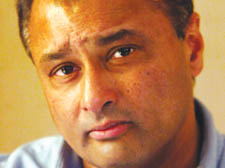|
|
 |
| |

Kim Sengupta |
Reporting from Iraq: ‘anyone different is a potential target’
THE Independent’s defence correspondent Kim Sengupta dwells in a house in Highgate when he’s not risking his life in Afghanistan or Iraq.
He is giving a talk at the Media Workers Against the War (MWAW) rally today (Thursday) at Westminster University – the day after the fifth anniversary of the “official end” of the war in Iraq.
The war is still far from over. It is just two weeks since the largest troop deployment of US-trained Iraqi armed forces in Basra were met with mighty resistance from Sadrist forces.
Electricity supplies and food and water channels were cut in a city of 1.5 million people, under the instruction of the Iraqi Prime Minister, Nouri al-Maliki.
Meanwhile, the US are overseeing the passage of the oil law, which would allow foreign – largely US – companies to control production and marketing of the Iraqi industry.
“There’s now a deep cynicism [among people of the West about] politics, politicians and journalists because they were misled,” said the veteran war correspondent. “The big wars can only take place if the Americans want to do it.”
Reporting on the weapons inspections in the run-up to the Iraq war felt like a “surreal sideshow,” he said. He believes the reasons for the invasion were not purely commercial but rooted in deeply ideological motivations as well.
He, meanwhile, steers clear of ideological proclamations and is not a member of the MWAW.
“It’s not a question of joining ranks,” he said. “It’s a question of debating mutual interests. People in this country don’t know about the sheer intimidation that journalists in the so-called liberated lands of Iraq and Afghanistan encounter and that’s something that hopefully we can address.”
He recalls his hotel in Baghdad being bombed: “I was lying in bed watching the room fly around. That was a shock because we didn’t think we would be a target.”
Insurgents never claimed responsibility and although it is unsubstantiated, the attack is widely believed to be the work of Iraqi politicians fed up with journalists writing about Iraqi death squads. Little wonder then that journalists choose to embed themselves with soldiers of the occupation.
“Anyone different is a potential target,” said Sengupta. “With my skin colour it’s easier for me than a white person to travel around.”
With the demand for instant 24-hour news coverage, are the internet bloggers and the tycoon media empires our only options? Or could a licensee-funded newspaper system work?
Sengupta approves of the participatory nature of citizen journalism on the internet but fears that standards of accuracy will be compromised and feels the not-for-profit option would lack the resources for a truly investigative media.
He yearns for the good old days of Harold Evans – Sunday Times editor from 1967-81 – when time-consuming investigations reaped “brilliant results” such as the Thalidomide campaign.
He said: “If the newspapers were owned by licensees the chances of editors affording months and months of investigation are simply not feasible. Ironically, your benign billionaire owner will be prepared to do that.”
SARA NEWMAN
• How the Media Sells War and Why rally is at The Old Lecture Theatre, University of Westminster, 309 Regent Street, W1, 7pm, tonight (Thursday) |

|
 |
|
 |
|

